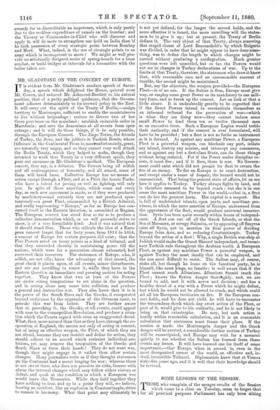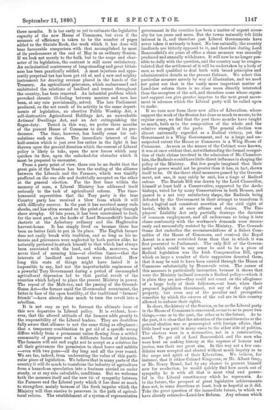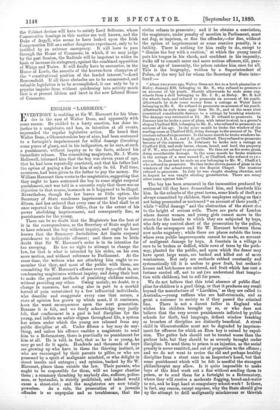SOME LESSONS OF THE SESSION.
THOSE who complain of the meagre results of the Session I. which came to a close on Tuesday, seem to forget that for all practical purposes Parliament has only been sitting
three months. It is too early as yet to estimate the legislative capacity of the new House of Commons, but even if the measure of efficiency is taken to be the number of pages added to the Statute Book, the work which it has done will bear favourable comparison with that accomplished by most of its predecessors at the end of May in an ordinary Session. If we look not merely to the bulk, but to the scope and char- acter of its legislation, the contrast is still more satisfactory. An ecclesiastical controversy of long-standing and great bitter- ness has been practically settled. A most injurious and appa- rently perpetual tax has been got rid of, and a new and mighty instrument for drawing revenue placed in the hands of the Treasury. An agricultural grievance, which embarrassed and embittered the relations of landlord and tenant throughout the country, has been removed. An industrial problem which provoked chronic ill-feeling between masters and men has been, at any rate provisionally, solved. The late Parliament produced, as the net result of its activity in the same depart- ments of legislation, an abortive Public Worship Act, a self-destructive Agricultural Holdings Act, an unworkable Artisans' Dwellings Act, and an Act extinguishing the Sugar-duty. Tested in this way, we prefer three months of the present House of Commons to six years of its pre- decessor. The time, however, has hardly come for cal- culations such as these. The immediate interest of the half-session which is just over lies rather in the light it has thrown upon the general direction which the current of Liberal policy is likely to take, upon the new forces which may quicken its flow, upon the unlooked-for obstacles which it must be prepared to encounter.
From a party point of view, there can be no doubt that the great gain of the Session has been the sealing of the alliance between the Liberals and the Farmers, which was timidly proffered on the one side and doubtfully accepted on the other at the general election. For the first time within the memory of man, a Liberal Ministry has addressed itself seriously to the task of agricultural reform. The time- honoured superstition that the Tory party is the true Country party has received a blow from which it will with difficulty recover. In the past it has survived many rude shocks, and has often seemed on the point of perishing through sheer atrophy. Of late years, it has been constrained to feed, for the most part, on the husks of Lord Beaconsfield's bucolic rhetoric at the Aylesbury ordinary and the Hughenden harvest-home. It has simply lived on because there has been no better faith to put in its place. The English farmer does not easily break with tradition, and so long as his in- terests and grievances were neglected by both parties alike, he naturally preferred to attach himself to that which had always been associated with the land, and which, moreover, was never tired of assuring him—at election times—that the interests of landlord and tenant were identical. How long this state of things might have lasted it is impossible to say, had not the imperturbable supineness of a powerful Tory Government during a period of unexampled agricultural depression led to that partial revolt of the counties, which helped to place the present Ministry in power. The repeal of the Malt-tax, and the passing of the Ground- Game Act—the former amid the ill-concealed resentment, the latter in face of the open hostility, of the traditional " farmers' friends"—have already done much to turn the revolt into a rebellion.
It is not easy as yet to forecast the ultimate issue of this new departure in Liberal policy. It is evident, how- ever, that the altered attitude of the farmers adds greatly to the responsibility of the Liberal leaders. They are doubtless fully aware that alliance is not the same thing as allegiance ; that a temporary combination to get rid of a specific wrong differs widely from a permanent union flowing from a settled community of purpose and a deliberate fusion of interests. The farmers will not and ought not to accept as a solatium for all their grievances the permission to shoot hares and rabbits —even with two guns—all day long and all the year round. We are far, indeed, from underrating the value of this parti- cular piece of legislation. We believe that in many parts of the country it will do much to transform the industry of agriculture from a hazardous speculation into a business carried on under steady, or at any rate calculable, conditions. But we welcome both the measure itself and the new tie of sympathy between the Farmers and the Liberal party which it has done so much to strengthen. mainly because of the fresh impulse which the Ministry will thus receive to persevere in the path of agricul- tural reform. The establishment of a system of representative
government in the counties has been a matter of urgent neces- sity for ten years and more. But the towns naturally felt little interest in it, and therefore past Liberal Governments have never taken it seriously in hand. No less naturally, the country landlords are bitterly opposed to it, and therefore during Lord Beaconsfield's six years of office a sham measure was annually produced and annually withdrawn. It will now be no longer pos- sible to dally with the question, and the country may be congra- tulated that the settlement of it will be undertaken by a body of men so well qualified to deal both with broad principles and administrative details as the present Cabinet. We select this particular measure merely by way of illustration, and we need not point out that in the vastly more important matter of Land-law reform there is no class more directly interested than the occupiers of the soil, and therefore none whose organ- ised support can give greater impetus to the next great move- ment in advance which the Liberal party will be called upon to make.
If we turn now from these new allies of Liberalism, whose support the work of the Session has done so much to secure, to its regular army, we find that the past three months have taught us much, both as to the composition of the whole and the relative strength of the parts. The general election was almost universally regarded as a Radical victory, yet the Government is a Whig Government, and to a large and un- suspected extent the House or Commons is a Whig House of Commons. As soon as the names of the Cabinet were known, it was at once evident that, notwithstanding the formal recogni- tion of their claims involved in the admission of Mr. Chamber- lain, the Radicals would have little direct influence in shaping the policy of the Ministry. But few people imagined that their indirect power would not be greater than it has, in fact, shown itself to be. Of the three chief measures passed by the Govern- ment, not one, it may safely be said, has a tinge of Radical colour. The Burials Bill was drawn by the Lord Chancellor, himself at least half a Conservative, supported by the Arch- bishops, voted for by many Conservatives in both Houses, and passed in a not very satisfactory shape, the Radicals being defeated by the Government in their attempt to transform it into a logical and consistent assertion of the civil right of burial, which it at once affirms and denies. The Em- ployers' Liability Act only partially destroys the doctrine of common employment, and all endeavours to bring it into closer conformity with the workmen's demands were strenu- ously and successfully resisted by the Ministry. The Ground- Game Act embodies the recommendations of a Select Com- mittee of the House of Commons, and received the Royal Assent in a more restricted form than that in which it was first presented to Parliament. The only Bill of the Govern- ment which could in any sense be said to be a piece of Radical legislation was the Irish Compensation Bill, upon which so large a number of their supporters deserted them, that it may be said to have been carried through the House of Commons substantially by Home-rule votes. The career of this measure is particularly instructive, because it shows that were the Ministry inclined towards a Radical policy—which it is plain they are not—they could not count on the allegiance of a large body of their followers,—at least, when their proposed legislation threatened, not any of the rights of property, but even any of the peculiar and prerogative remedies by which the owners of the soil are in this country allowed to enforce their rights.
In short, the history of the Session, so far as the Liberal party in the House of Commons is concerned, seems to us to prove two things,—one as to the past, the other as to the future. As to the past, it is clear that the attention of the constituencies at the general election was so preoccupied with foreign affairs, that little heed was paid in many cases to the other side of politics. The electors were in a destructive, not in a constructive, mood. To get rid of Lord Beaconsfield, and the men who were bent on making history at the expense of honour and justice, was their one great aim. In this way not a few can- didates were accepted and elected without much inquiry as to the scope and spirit of their Liberalism. We believe, for instance, that if either Colonel Kingscote, or Mr. Albert Grey, or Mr. Henry Brand, had by any chance to present himself now for re-election, he would quickly find how much out of sympathy he is with all that is most vital and power- ful in the Liberal constituency which he represents. As; tothe future, the prospect of great legislative achievements: does not, in some directions at least, look as hopeful as it did. Take the great question of the immediate future, to which we have already referred—Land-law Reform. Any scheme which
the Cabinet devises will have to satisfy Lord Selborne, whose Conservative leanings in this matter are well known, and the Duke of Argyll, who seems to have looked upon the Irish Compensation Bill as a rather dangerous experiment, only to be justified by an extreme emergency. It will have to pass through the House of Commons, in which, if we may judge by the past Session, the Radicals will be impotent to widen its basis or increase its stringency, against the combined opposition of Whigs and Tories. It will finally have to encounter, in the House of Lords, the assaults of the heaven-born champion of the " constitutional position of the landed interest,"—Lord Beaconsfield. If all these obstacles are to be surmounted, and valuable legislation is to be accomplished, it can only be by a popular impulse from without quickening into activity much that is at present lifeless and inert in the new Liberal House of Commons.




































 Previous page
Previous page